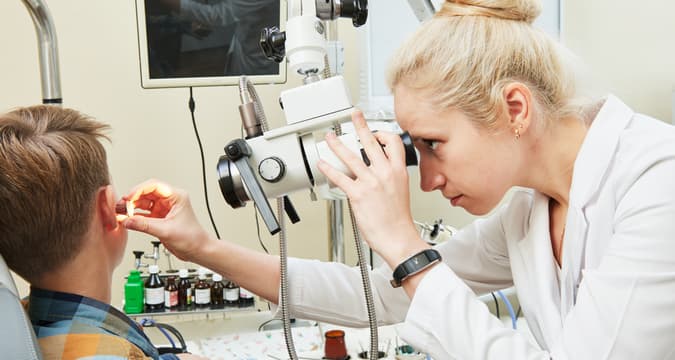An ENT surgeon is a doctor who specializes in the surgical treatment of diseases and pathological conditions of the ear, nose and throat, and related structures of the head and neck.
The field of surgical otolaryngology encompasses a wide range of operations not restricted to the ear, nose and throat. It also includes plastic and reconstructive surgery on the facial skeletal structures, removal of neoplasms occurring in the head and neck area, and emergency interventions to remove foreign bodies from the respiratory tract. At GMS Hospital we have a team of highly skilled otolaryngologists with extensive experience and skills acquired during internships at leading medical centers in the USA, Europe and Israel. They have comprehensive knowledge of classical and modern surgical methods for treating pathologies of the upper respiratory tract.
According to statistics, ENT pathologies are some of the most common health ailments. Surgical treatment is performed if conservative therapy proves ineffective, or as an independent method of treatment for many chronic acquired and congenital pathologies of the upper respiratory tract and adjacent head and neck structures.

Sign up for a consultation with an otolaryngologist if you experience any of the following symptoms or conditions:
The otolaryngologist is the specialist to contact for curing chronic ear infections, removing polyps in the nasal cavity, or correcting a curved nasal septum. They also treat nighttime breathing issues such as sleep apnea.
ENT surgeons at GMS Hospital successfully treat various pathologies of the ear, nose, and throat, as well as diseases and disorders of other organs and systems that may affect the health of the ear, nose and throat, such as:
Surgical procedures to treat diseases of the ear, nose and throat at GMS Hospital are performed by a team of experienced doctors, using modern approaches and guided by the fundamental concepts of evidence-based medicine. At the Center of Operative Otolaryngology we use gentle, minimally-invasive methods and techniques so that the patient can return to an active and healthy life as quickly as possible.
The initial consultation with an otolaryngologist begins with a discussion of the patient’s complaints. The doctor will examine the patient using various instruments such as a headlamp illuminator, an otoscope for examining the ears, and flexible and rigid endoscopes for examining the nasal passages. During an endoscopic examination, a computer display is provided so that the doctor can provide the patient with a visual understanding of the problem areas. The otolaryngologist also makes a comprehensive assessment of the general state of the ENT organs, identifying any additional problems that may affect the success of the treatment:
Based on the symptoms and their severity, a number of diagnostic tests may be prescribed. For complaints of hearing loss, for example, tympanometry and threshold tone audiometry tests are performed using a special audiometer. To obtain a complete picture of the disease or disorder, an otolaryngologist surgeon may have the patient undergo additional examinations:
No preliminary preparation is required for a consultation with an otolaryngologist. All you need is to make an appointment online or by phone.
The otolaryngologists at GMS perform almost all types of operations, both emergency and elective, on the ENT organs and structures of the head and neck:
Our clinic is equipped with advanced high-tech equipment, enabling our doctors to perform ENT operations quickly and with the best clinical results. The use of gentle microsurgical techniques significantly reduces surgical trauma and postoperative recovery. All surgical interventions and postoperative therapies are performed in accordance with the highest international standards, either as outpatient procedures or with a one-night stay in our inpatient facility.
Most ENT operations are performed using endoscopic technology. Radio wave and laser surgery are also extensively used, ensuring the best therapeutic results with minimal operating trauma, a short recovery period, minimal postoperative pain, and low risk of complications.

For example, treating chronic sinusitis no longer requires the traumatic procedure of paracentesis (puncture). By using the latest scientific technology in the field of microsurgery, doctors can cure chronic inflammation of the paranasal sinuses without a puncture, using a minimally invasive procedure: endoscopic drainage of the sinus fistula.
Removal of adenoids at GMS Hospital is a quick procedure that will eliminate once and for all the significant problems your child would suffer due to swollen adenoids. Just one hour after the procedure our young patients can drink liquids, after 2 hours they can have ice cream, and after 3 hours they can go home.
Progress in the field of operative otolaryngology is constantly advancing. Our doctors are trained in the latest operative techniques, and can offer patients the most effective options for surgical intervention.
The otolaryngologist will determine whether the illness can be treated conservatively or whether an operation is required. When surgery is necessary, this specialist will personally oversee all the stages of treatment. He or she will conduct all the necessary preoperative measures, perform the operation, and provide support to the patient in the postoperative period. Some interventions require a hospital stay.
The otolaryngologist will draw up an appropriate recovery plan for both in-patient and out-patient procedures. You can sign up at any time online or by phone for a consultation with an otolaryngologist at GMS Hospital.
Our specialists will contact you